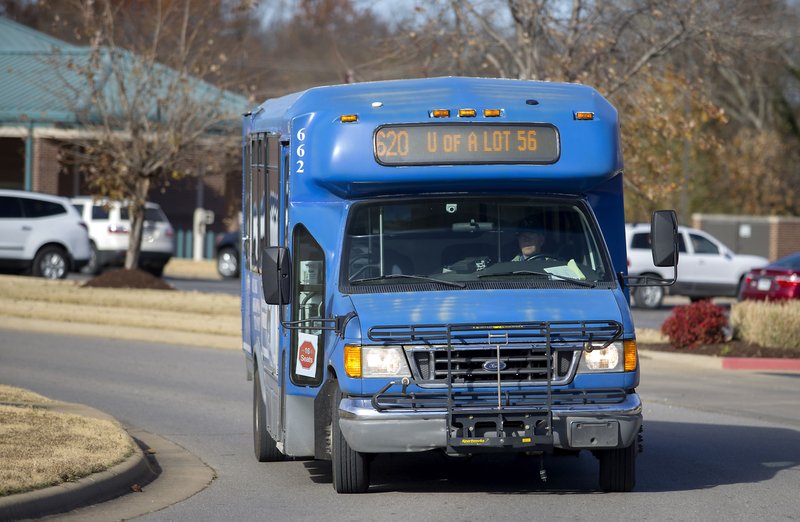SPRINGDALE -- Ozark Regional Transit is struggling to rise from the ashes of a devastating fire that destroyed most of its bus fleet, but officials still are looking at ways to expand services down the road.
The public transit provider has commissioned a study of the U.S. 71B corridor from Fayetteville to Bentonville to determine whether a "light" version of bus rapid transit would be feasible.
Rising from the ashes
A wind-whipped fire at Ozark Regional Transit’s Springdale bus barn Jan. 10 destroyed 20 buses. Explosions launched parts of buses more than three blocks away. The burned-out hulks are being left where they are, under a canopy that also will have to be replaced, until fire and insurance inspectors finish their work.
The fire investigation is expected to resume Thursday and Friday. After that part of the investigation is done, ORT should be able to have the damaged vehicles removed, along with the canopy, and have the area cleaned up so the rebuilding process can begin.
Board members Thursday approved allowing ORT to apply for federal grants to help replace the destroyed buses.
Source: Staff report
ALSO ON NWAONLINE
http://www.nwaonlin…">Bills aim to develop workforce
http://www.nwaonlin…">Fayetteville should improve income gap between white, black residents, Gates Foundation rep says
http://www.nwaonlin…">Children's dental health gets spotlight in NWA
http://www.nwaonlin…">Benton County to make data-based decisions on roads with detailed survey
http://www.nwaonlin…">Arkansas Grown hosts conversation for farmers, restaurateurs in Springdale
"I think we can provide a lot of service for a lot of people," Joel Gardner, executive director, told board members Thursday.
Bus rapid transit typically uses dedicated lanes giving priority to buses at intersections and uses design features to reduce delays caused by passengers boarding or leaving buses or purchasing fares. The idea is to combine the capacity and speed of a metro rail system with the flexibility, lower cost and simplicity of a bus system.
The transit study is looking for less expensive and less intrusive options that can be done relatively quickly.
"We're looking to feed connections northbound and southbound, depending on how it pans out financially," Gardner said. "The overall focus is to get people who are living in Fayetteville up to areas where they work in Bentonville or people living in the Bentonville and Rogers area down to where they work in Fayetteville and, of course, in between."
A study will be done by KFH Group of Austin, Texas, and is expected to begin Wednesday and conclude June 30. Results are expected to be presented in July.
"They're going to look at the 71 Business corridor as it sets right now, without improvements, then they're going to look at what it's going to take to improve it so that we can use this corridor, with some minor modifications, so that the buses integrate with the existing traffic," Gardner said.
Gardner said the study will consider traffic signal priorities, park-and-ride locations with bus stations and bus pull-outs, among other things.
The study is being paid for with a Walton Family Foundation grant of about $140,000. Gardner said he and transit staff have been working for the last 18 months to secure money for the study.
Gardner said he eventually would like to see buses leaving each end of the Bentonville-to-Fayetteville corridor every 10 to 15 minutes during peak hours with regular stops along the way. Off-peak hours would possibly see 30-minute intervals.
Tim Conklin, a senior planner at the Northwest Arkansas Regional Planning Commission, said more information about public transit options is always helpful.
"Additional information on the feasibility and the cost of doing something that's maybe a little less than what we've studied would be welcomed for the region to better understand what these types of transportation systems look like and cost to run," Conklin said. "At some point, as a region, we need to discuss how our transit system operates and whether we can afford additional evening service and weekend service as a region. We do need to have an overall transit discussion because currently it's limited and funding to provide that service is also limited."
Bus rapid transit was considered in an analysis of transportation alternatives done for Regional Planning in 2014. The study found a traditional bus rapid transit system on the corridor would cost some $100 million and take 10 years to implement.
That same analysis found commuter rail on the Arkansas & Missouri Railroad right-of-way would cost some $664 million and $2.2 billion on new right-of-way closer to Interstate 49.
"It's looking at something less than we looked at that could potentially be implemented in a shorter time frame at a lower cost," Conklin said of the Ozark Regional Transit study. "I think Regional Planning would be really interested in participating and collaborating with ORT and their consultant to look at how it complements what we have done in the past and see what recommendations they come up with regard to it on 71B through the cities."
NW News on 02/27/2017

